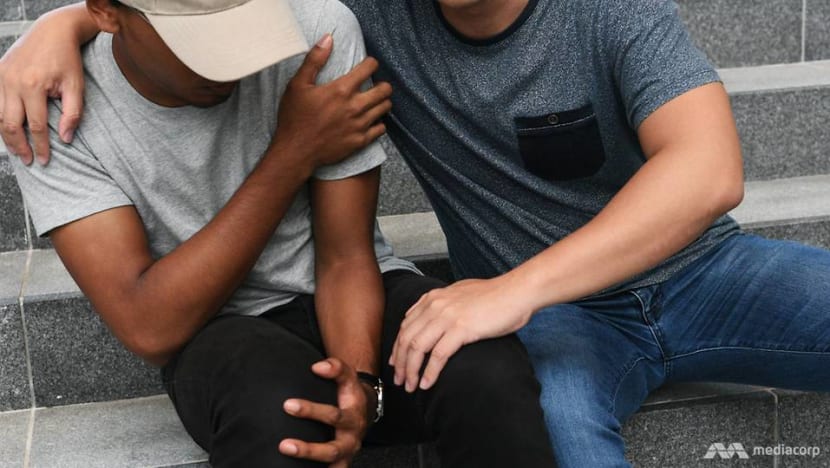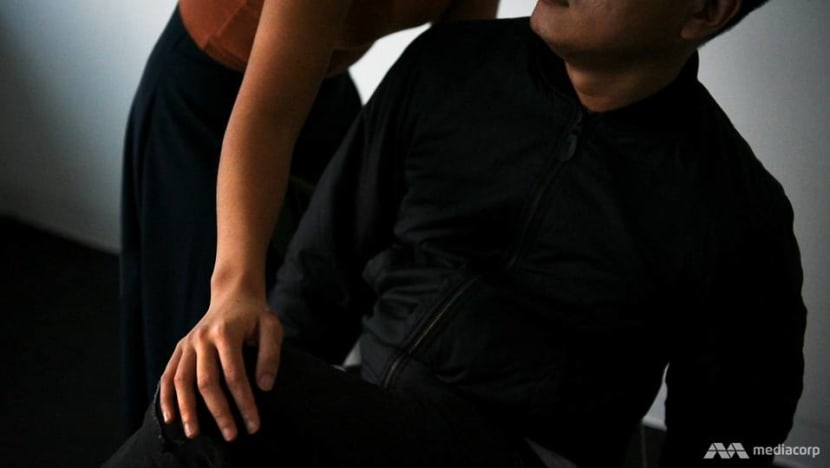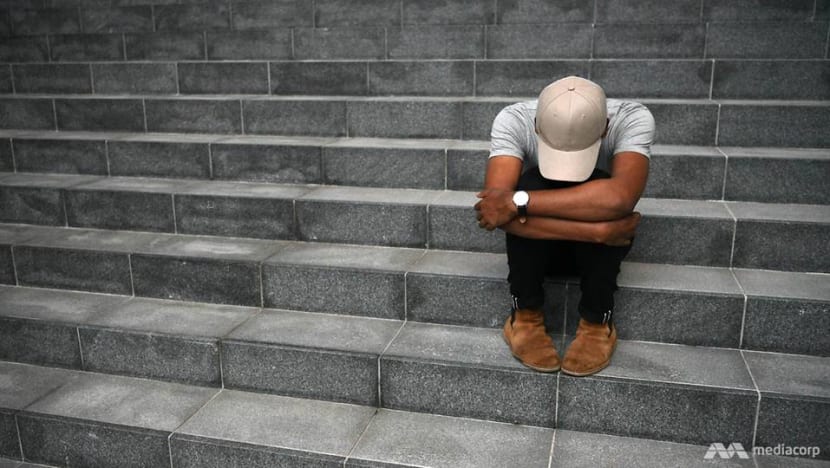Male molest numbers continue to rise; experts say some victims struggle to report cases

Photo illustration by Try Sutrisno Foo
SINGAPORE: He was studying with a close friend in a secluded room in the school library when it happened.
While sitting next to him, his friend reached over and massaged his groin area. James (not his real name) thought his friend was trying to be funny. He laughed, nudged his friend’s hand away and asked him to stop.
But his friend continued to touch him.
Recounting the incident to CNA, James said he started to feel uncomfortable, and thought about shouting at his friend or walking away. But he did not want to cause a scene in the quiet library, so he pushed his friend’s hand away again and told him to stop.
This went on five or six more times, until his friend eventually stopped touching him about 10 to 15 minutes later.
James, then 17, never expected to be molested, least of all by a close friend whom he had known for years. After the incident, they remained friends but eventually drifted apart after graduating from junior college.
He did not report the incident to teachers or the police, and never confronted his friend.
Now 26, James told CNA it did not even occur to him that he had been molested at the time, adding that he only realised months later, after his friend confessed to having feelings for him.
He said he did not report the incident because he “didn’t feel very wronged by what happened”, and didn’t see the point of going to the authorities.
“I could have stopped him at any time. I could have shouted or I could have walked away. It was my choice to stay there,” said James. “I didn’t feel like I was violated, but I also didn’t know what to do.”
Although many men might find it difficult to come forward about being molested, the number of outrage of modesty cases involving male victims has increased steadily, from 73 cases in 2009 to 125 last year, according to police data.
READ: 7 molest suspects to be charged; police say outrage of modesty cases on the rise
The Sexual Assault Care Centre (SACC) at the Association of Women for Action and Research (AWARE) has seen a similar spike. The Centre saw 14 male clients seeking counselling for physical sexual harassment, including outrage of modesty, in 2018, up from seven in 2017 and five in 2016.
The overall number of males approaching SACC also increased. The centre saw 37 male clients in 2018, up from 17 in 2017 and 15 in 2016.
Ms Anisha Joseph, head of the SACC, said it’s “not surprising” that more male victims are open to coming forward about their experiences after hearing others speak openly about their trauma.
For example, sexual assault survivors could be feeling more empowered because of the advent of the #MeToo movement in 2017, she said.
“Public discourse and a more supportive stance from individuals and organisations have begun to normalise the act of seeking help,” she added.
READ: More than 40,000 sign petition against NUS student's sentence in molest case
More official reports of sexual crimes may encourage victims to speak out, said senior clinical psychologist at the department of developmental psychiatry in the Institute of Mental Health (IMH) Fiona Tan.
“With every report made, it means there is more accurate information being shared and discussed about sexual abuse and how it can occur across genders, races, socio-economic status and educational backgrounds,” she added.
“In turn, people who have experienced sexual abuse or molestation and the people who support them are also more confident to report on their experiences, regardless of their gender.”
She noted that IMH works mostly with youths between the ages of 6 to 19, with the IMH Child Guidance Clinic under the Forensic Rehabilitation, Intervention, Evaluation & Network Development Services (FRIENDS) programme. There is no similar programme for adults.
This steady increase in the number of male victims in outrage of modesty cases comes amid a spike in the overall number of such cases reported. According to police data, there were 1,741 outrage of modesty cases in 2018, an increase of 11.9 per cent from 1,561 cases in 2017, and an increase of 21.8 per cent from 2016 to 2017.
The Singapore Police Force (SPF) said recently that outrage of modesty cases have been on an increasing trend and remain a key concern for the police.
“The police will continue to work closely with stakeholders and the community to prevent and deter outrage of modesty cases,” said SPF.
READ: Security guard jailed for molesting man on train, showing him porn
Despite the increase in the number of reported cases, experts stressed that many cases still go unreported, and that male victims may find it more difficult to come forward about their experiences than female victims.
Experts noted that gender stereotypes and myths about the sexual abuse of males can make them scared of the consequences of reporting the case or seeking help.

For example, people might respond, “How can this happen to a man?”, “You should have been able to prevent or stop it,” or even “You’re lucky to have been touched by a girl.”
Male victims often feel ashamed, guilty, helpless or believe that they were the cause of the abuse, said Ms Tan.
“They may feel that it is “their fault” for being “unmanly” and had “attracted the abuse” or failed to stop the abuse from happening,” she added.
She also stressed that many males do not understand that the body can respond to sexual stimulation even in situations that were unwanted, traumatic or painful.
“Many boys and men may still believe the gender myths that if he experienced sexual arousal during the abuse, he wanted and or enjoyed it, and since he may have wanted it, then the abuse was his fault,
“These conflicting feelings of care, pleasure, fear, guilt, betrayal, and confusion, can be intense and make disclosure a difficult process for the males who had been molested.”
READ: Man sentenced for sex assault on boy at Halloween sleepover found unfit for caning, wants mattress
Although it may be difficult to seek help after being molested, Ms Joseph stressed that healthy and emotional processing is an important part of recovery from the trauma of sexual assault.
“We live in a society where men and boys are not allowed to express their emotions or are ridiculed for doing so. This makes it hard for them to seek help,” said Ms Joseph, head of the SACC.

Adding that many male victims of sexual crimes who reach out to SACC usually had not shared their experiences with anyone else, she said that negative sentiments from other people may make victims question their own experience of sexual assault.
“Men and boys face unique challenges as a result of toxic attitudes about masculinity,” she added.
According to Ms Joseph, about seven in 10 SACC clients, both male and female, do not report their experiences to the authorities.
Leow Yangfa, registered social worker and executive director of LGBT non-profit organisation Oogachaga say many male victims hesitate to come forward because they fear that people would not believe them.
Adding that perpetrators are more likely to be male, he said some straight male victims would also worry about being seen as gay or less of a man, and a male victim who is gay may fear being outed, blamed, or accused of “asking for it”.
Experts also called for more public education on the matter. For example, Mr Leow said that men may not know how to report such crimes, or that it is criminal for a man to molest another man since public education messages usually depict female victims.
“Public education to dispel myths about sexual violence, challenge gender stereotypes and encourage all survivors, including men, to get support, is crucial,” said Ms Joseph.
Adding that increasing numbers of victims coming forward is a “positive sign” that they feel safer to speak out and seek help, Ms Joseph noted that the SACC saw a 79 per cent increase in cases after the #MeToo movement begun in October 2017.
“The case numbers have not abated since. This indicates that, even if it wasn’t very visible to the wider public, #MeToo did have an impact on Singaporean culture. It encouraged survivors to come forward and seek the help they needed.”












